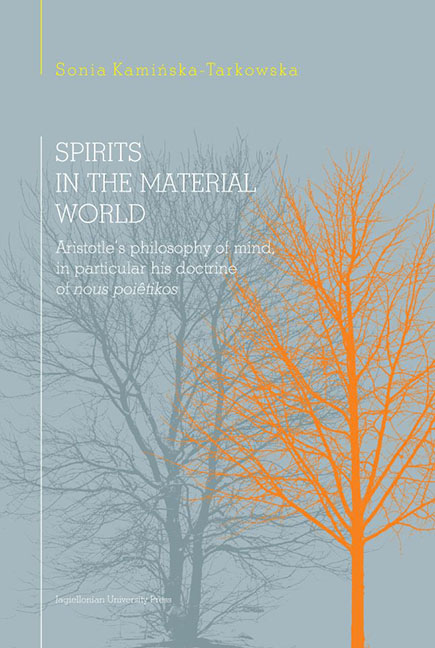 Spirits in the Material World
Spirits in the Material World Published online by Cambridge University Press: 14 October 2023
Possible Readings of Aristotle’s Nicomachean Ethics, Book X
Above, I presented two possible interpretations of the notorious active intellect whose proper function still remains uncertain. These were: (a) the mystical and (b) the rational one. According to (a) nous poiêtikos does not belong to a particular human being but is identical with Deity or a divine sphere. Moreover, humans are capable of a sort of mystical union with it and this is how they access and emulate the Deity. According to (b) nous poiêtikos belongs to us and through its activity we can learn about the Deity and strive after it. In both (a) and (b) there is a sort of an imperative to follow what is divine, in order to lead a good life. This is why I decided to examine which of these two viewpoints is more appropriate, by comparing the paths leading to such a life proposed by each of them. I decided to use the book X of Aristotle’s Nicomachean Ethics as a criterion. This is where the philosopher’s theoretical life finds its most famous description. Let us then begin with presenting the most important fragments thereof.
(I) If happiness is activity in accordance with virtue, it is reasonable that it should be in accordance with the highest virtue; and this will be that of the best thing in us. Whether it be reason or something else that is this element which is thought to be our natural ruler and guide and to take thought of things noble and divine, whether it be itself also divine or only the most divine element in us, the activity of this in accordance with its proper virtue will be perfect happiness. That this activity is contemplative we have already said. Now this would seem to be in agreement both with what we said before and with the truth. For, firstly, this activity is the best (since not only is reason the best thing in us, but the objects of reason are the best of knowable objects); and secondly, it is the most continuous, since we can contemplate truth more continuously than we can do anything.
To save this book to your Kindle, first ensure [email protected] is added to your Approved Personal Document E-mail List under your Personal Document Settings on the Manage Your Content and Devices page of your Amazon account. Then enter the ‘name’ part of your Kindle email address below. Find out more about saving to your Kindle.
Note you can select to save to either the @free.kindle.com or @kindle.com variations. ‘@free.kindle.com’ emails are free but can only be saved to your device when it is connected to wi-fi. ‘@kindle.com’ emails can be delivered even when you are not connected to wi-fi, but note that service fees apply.
Find out more about the Kindle Personal Document Service.
To save content items to your account, please confirm that you agree to abide by our usage policies. If this is the first time you use this feature, you will be asked to authorise Cambridge Core to connect with your account. Find out more about saving content to Dropbox.
To save content items to your account, please confirm that you agree to abide by our usage policies. If this is the first time you use this feature, you will be asked to authorise Cambridge Core to connect with your account. Find out more about saving content to Google Drive.